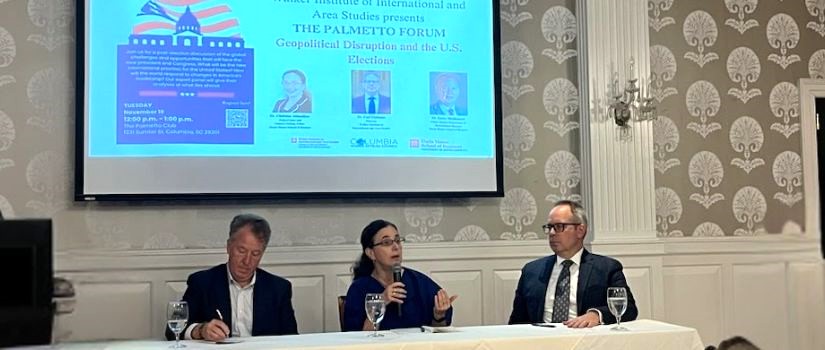As a new administration prepares to take office, experts are already discussing how its policies will redefine America's role at home and abroad. At the Palmetto Forum on November 19th, 2024, a panel of distinguished scholars—Dr. Christina Ahmadjian, Dr. Gerry McDermott, and Dr. Carl Dahlman—explored the global challenges and domestic priorities that could shape the next four years.
Dr. Christina Ahmadjian is a Sonoco Visiting Fellow at USC’s Darla Moore School of Business. With her experience as the former Dean of Hitosubashi University Graduate School of International Corporate Strategy and from serving on the boards of leading Japanese corporations, she shared unique insights on the current state of the world, for example, the economy in Japan and trade in East Asia.
Dr. Gerry McDermott is Professor and Chair of International Business at USC’s Darla Moore School of Business. His expertise includes a focus on the local impacts of international integration.
Dr. Carl Dahlman is a Professor of Geography and Director of the Walker Institute. He is an expert on topics such as geopolitics of war, peace, and migration, with a focus on the Middle East and Europe.
Dahlman began the panel discussion by stating that U.S. foreign policy would probably see some significant changes with the arrival of the Trump administration, especially in relation to trade, tariffs, and military cooperation. McDermott added that South Carolina is ranked among the top five internationalized states in the U.S. and has very high levels of FDI per capita, indicating a remarkable change in the last couple of decades. It has ushered in a new age for the economic partnerships between the U.S. and foreign firms in South Carolina and the entire nation. He mentioned that more than “1,200 foreign-owned firms are operating in S.C.” This also includes China as it ramps up foreign direct investment into the U.S. as a hedge against risk in the region.
To put that in perspective, Dahlman mentioned that trade between the United States and the E.U was estimated to total nearly $1.3 trillion USD. There is a strong desire for the Trump administration to strengthen bilateral treaties and negotiate improved terms for the U.S.
On the same topic, Dahlman discussed the escalating conflicts in the Middle East, referencing Israel’s six-front war over the past year. He questioned whether the Trump administration would have much influence in negotiating with the Israeli government, specifically with the current leadership. Like many nations, the U.S. wants to avoid direct confrontations between Israel and Iran, which could ignite an already volatile region.
The panelists wrapped up this month's Palmetto Forum by reflecting on the large changes set to take place as the Trump administration takes office, such as mass deportation campaigns, and how those changes will affect the economy and diplomatic relations with regional neighbors.
